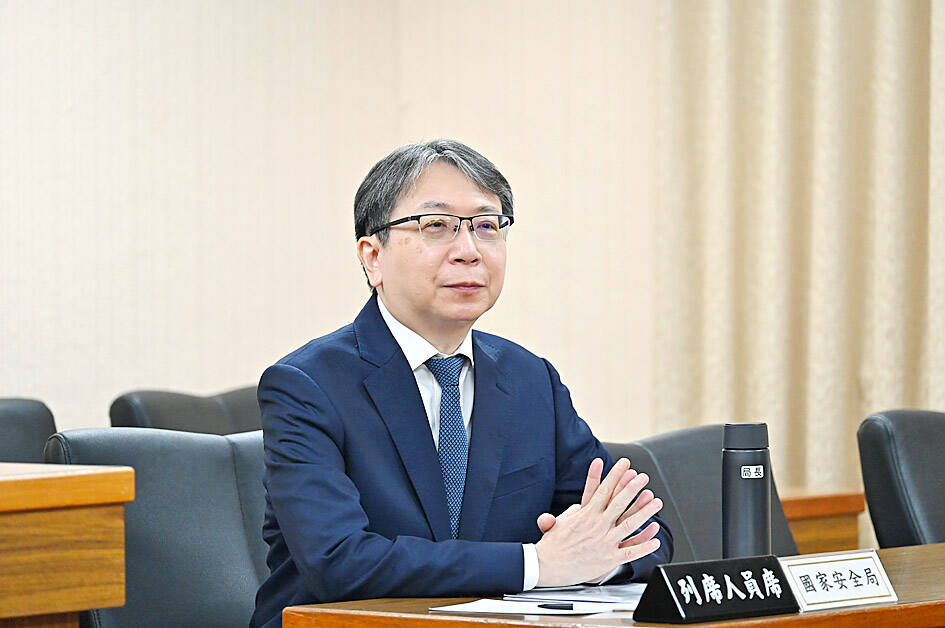The National Security Bureau (NSB) identifies up to 30,000 online posts containing false information every week, sending the most notable items to the National Security Council to review, it said yesterday.
At a hearing of the legislature’s Foreign and National Defense Committee, Chinese Nationalist Party (KMT) Legislator Hsu Chiao-hsin (徐巧芯) asked NSB Director-General Tsai Ming-yen (蔡明彥) how the bureau addresses false information online.
As an example, Hsu asked about a rumor circulating online in January that then-vice presidential candidate Hsiao Bi-khim (蕭美琴) had a secret boyfriend.

Photo:Chien-jun, Taipei Times
Tsai said that NSB staff and automated systems keep records of controversial content, including the rumor about Hsiao.
The agency has collected about 1.3 million controversial posts since last year, from which it has identified 20,000 to 30,000 posts containing false information every week, he said.
After fact-checking, it reports about 5,000 to 6,000 posts every week to the council and Executive Yuan, which then decide whether and how to respond, he added.
Pressed about how the bureau handles false claims, Tsai said that its role is simply to collect and report, and it is the responsibility of other agencies to respond.
In other security news, Taiwan has raised the alarm about the growing risks Taiwanese could face when visiting China, pointing to an expanded state secrets law that took effect yesterday.
Chinese lawmakers in February passed the revised Law on Guarding State Secrets, expanding the definition of such sensitive information to include a new category known as “work secrets,” state-run Xinhua news agency reported.
For Taiwanese, the expanded law means the risk of visiting China is likely to “increase significantly,” the Mainland Affairs Council said in a statement on Tuesday.
Under the updated law, the “work secrets” category is defined as information that is “not state secrets, but will cause certain adverse effects if leaked,” the council said.
The expanded legislation was “highly vague and may cause people to break the law at any time,” it added.
At the time of the law’s passage, Xinhua said the legislation stressed “the importance of upholding the CCP’s [Chinese Communist Party’s] leadership over work to guard state secrets.”
The council criticized Beijing for “continuously using legislations” to strictly monitor overseas visitors to China, saying that cases of “fabricated crimes” being leveled against Taiwanese and foreigners “are not uncommon.”
“We would like to once again remind the public to refrain from going to China for the time being unless necessary,” it said.
Among the most high-profile Taiwanese arrested in China was democracy advocate Lee Ming-che (李明哲) in 2017. He was jailed for five years on a national security conviction and released in 2022.
Last year, a Taiwanese man who is vice chair of a minor political party that advocates for Taiwanese independence was arrested in China and charged with “secession.”

‘DENIAL DEFENSE’: The US would increase its military presence with uncrewed ships, and submarines, while boosting defense in the Indo-Pacific, a Pete Hegseth memo said The US is reorienting its military strategy to focus primarily on deterring a potential Chinese invasion of Taiwan, a memo signed by US Secretary of Defense Pete Hegseth showed. The memo also called on Taiwan to increase its defense spending. The document, known as the “Interim National Defense Strategic Guidance,” was distributed this month and detailed the national defense plans of US President Donald Trump’s administration, an article in the Washington Post said on Saturday. It outlines how the US can prepare for a potential war with China and defend itself from threats in the “near abroad,” including Greenland and the Panama

A wild live dugong was found in Taiwan for the first time in 88 years, after it was accidentally caught by a fisher’s net on Tuesday in Yilan County’s Fenniaolin (粉鳥林). This is the first sighting of the species in Taiwan since 1937, having already been considered “extinct” in the country and considered as “vulnerable” by the International Union for Conservation of Nature. A fisher surnamed Chen (陳) went to Fenniaolin to collect the fish in his netting, but instead caught a 3m long, 500kg dugong. The fisher released the animal back into the wild, not realizing it was an endangered species at

The Chinese Nationalist Party (KMT) is maintaining close ties with Beijing, the Democratic Progressive Party (DPP) said yesterday, hours after a new round of Chinese military drills in the Taiwan Strait began. Political parties in a democracy have a responsibility to be loyal to the nation and defend its sovereignty, DPP spokesman Justin Wu (吳崢) told a news conference in Taipei. His comments came hours after Beijing announced via Chinese state media that the Chinese People’s Liberation Army’s Eastern Theater Command was holding large-scale drills simulating a multi-pronged attack on Taiwan. Contrary to the KMT’s claims that it is staunchly anti-communist, KMT Deputy

The High Prosecutors’ Office yesterday withdrew an appeal against the acquittal of a former bank manager 22 years after his death, marking Taiwan’s first instance of prosecutors rendering posthumous justice to a wrongfully convicted defendant. Chu Ching-en (諸慶恩) — formerly a manager at the Taipei branch of BNP Paribas — was in 1999 accused by Weng Mao-chung (翁茂鍾), then-president of Chia Her Industrial Co, of forging a request for a fixed deposit of US$10 million by I-Hwa Industrial Co, a subsidiary of Chia Her, which was used as collateral. Chu was ruled not guilty in the first trial, but was found guilty